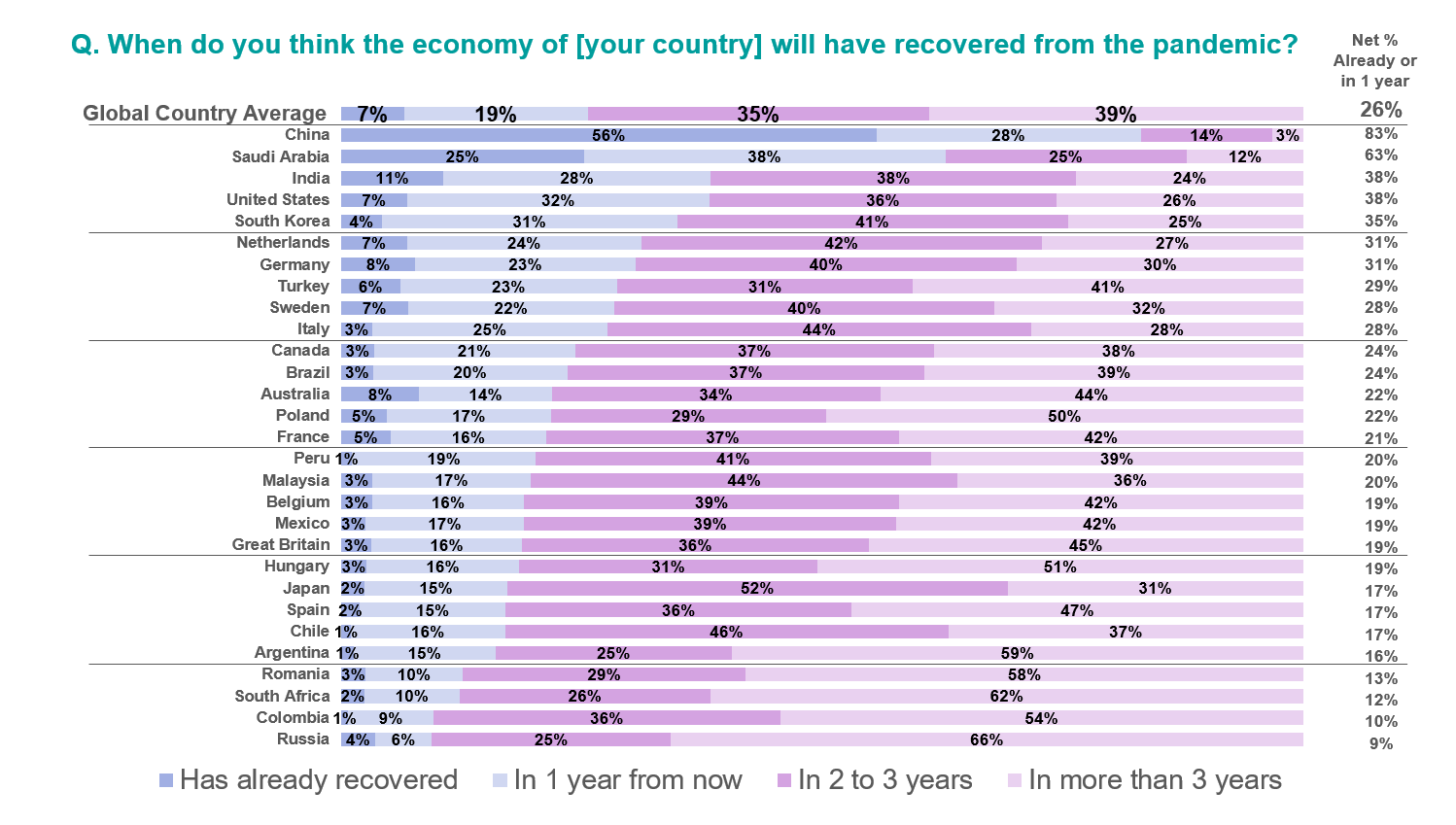These countries are the most optimistic about economic recovery from the pandemic

People in different countries have varying levels of optimism about when they think the economy will bounce back. Image: Unsplash/Ross Sneddon
Listen to the article
- China is the most optimistic country when people are asked when they think there will be an economic recovery from the pandemic.
- By comparison, people in Russia are the most pessimistic.
- One thing most people seem to agree on is that they expect their governments to take responsibility for leading the return to growth.
More than half of people in China think the economy there has already recovered from the pandemic.
That’s one of the headline findings of a survey carried out by Ipsos and the World Economic Forum, between 25 June and 9 July. Altogether, more than 21,500 people in 29 countries were quizzed on their views of post-pandemic economic life.
Some 56% of Chinese respondents said things were already back to where they should be. That number shoots up to 83% when those who think the recovery will have happened within a year are factored in.
In Saudi Arabia too, a majority of people (63%) think the recovery will have happened in a year’s time. There, 25% say the economy has already recovered.

Elsewhere, however, optimism is in shorter supply. Of the 29 countries surveyed, Russia, Colombia, South Africa and Romania are the places where the fewest people expect a swift recovery.
In Russia, just 4% of people think the recovery has happened and just 6% more think things will be better in a year. A large majority (66%) expect to have to wait more than three years for the economy to bounce back.
Between one half and two-thirds of survey respondents in South Africa, Argentina, Romania, Colombia, Hungary, and Poland say they think economic recovery is more than three years away, following the pandemic.
Looking ahead
When it comes to the question of who should assume responsibility for leading a country to economic recovery, the answer given most often by respondents was their government. Averaged across all 29 countries, that was the view of 53% of people. But 48% of people didn’t mention their government at all when thinking about where a recovery might come from, indicating a possible lack of trust in their national leaders.

In Russia, nine out of 10 people surveyed said the government carries the responsibility for sorting things out. Close behind, other countries where a very large majority felt that way include Hungary (88%), South Korea (86%), China (78%), Malaysia (73%) and Saudi Arabia (70%).
An almost-mirror-image of those findings came when Ipsos asked whether small businesses should be responsible for the post-pandemic economic recovery. Low numbers of people in Russia (7%), South Korea (10%), Hungary (14%), and Saudi Arabia (19%) thought that was the case. Those countries where the largest numbers of people do think small businesses have a major role to play, are all Spanish-speaking.
“The world is at a global turning point where leaders must cooperate, innovate and secure a robust recovery," said Sarita Nayyar, Managing Director, World Economic Forum, adding that corporations, civil society and governments must work together to address the major challenges facing the globe and that "those that focused on the short-term have been the first to suffer".
Reading the signs
The survey also looked at what people think an economic recovery looks and feels like – the signs that will tell them things are getting better. It transpires there are two things that lead people to think things are getting better. The first is when they see people they know being called back to work or getting a new job. An average of 79% of people gave that as their top answer. It was closely followed by seeing new businesses open (78%).

Across all 29 countries surveyed, the range of answers citing those two indicators was from 63% to 89%.
What is the World Economic Forum doing to help the manufacturing industry rebound from COVID-19?
An increase in tourism was also mentioned as a key sign of recovery by a global average of 72%. It was highest in China (90%), Saudi Arabia (85%) and South Africa (84%), and lowest in Argentina (52%), Russia (59%) and Colombia (60%).
Don't miss any update on this topic
Create a free account and access your personalized content collection with our latest publications and analyses.
License and Republishing
World Economic Forum articles may be republished in accordance with the Creative Commons Attribution-NonCommercial-NoDerivatives 4.0 International Public License, and in accordance with our Terms of Use.
The views expressed in this article are those of the author alone and not the World Economic Forum.
Stay up to date:
Pandemic Preparedness and Response
Related topics:
Forum Stories newsletter
Bringing you weekly curated insights and analysis on the global issues that matter.
More on Health and Healthcare SystemsSee all
Mansoor Al Mansoori and Noura Al Ghaithi
November 14, 2025








